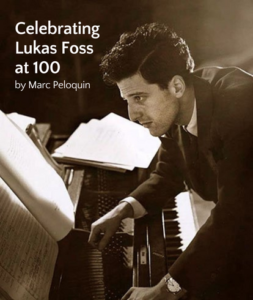
Upbeat! Blog #2 –
Celebrating Lukas Foss at 100 by Marc Peloquin
I attended an amazing concert at Carnegie Hall on October 3 by the Buffalo Philharmonic conducted by JoAnn Falletta. It was a tribute to the American composer/conductor/pianist Lukas Foss. The evening was truly memorable and I’m glad I took the opportunity to experience such a thoughtful and brilliant presentation of his music.
Lukas Foss achieved remarkable distinction as a composer who was universally regarded not only as one of America’s leading 20th-century composers but also as one of the major forces on the American music scene generally. In 1974 Aaron Copland referred to his works as “among the most original and stimulating compositions in American music.”
What struck me about this program was his ability to create music that was highly eclectic, well crafted, inspired and full of rich imagination. His works certainly defy classification as he himself refused to be categorized. He embraced a wide range of styles, techniques, influences, and approaches: from Copland-type Americana to the neoclassicism of Stravinsky, from aleatoric and graphic to precisely notated music, from tonality to rigorous serial techniques, and from stabs at his own brand of minimalism (long before it was fashionable).
I was fortunate to see Foss in action when I was a student at Boston University. He was on the composition faculty and would often appear in concerts as conductor of his works as well as music from the baroque and classical period. I then would see him around at the Manhattan School of Music in a similar capacity. I suppose I took it for granted that he was such a unique force and devoted musical citizen and thought he would always be with us. His music and recordings will certainly live on.
Foss always struck me as a renaissance man, equally skilled as composer, pianist, conductor and educator. He didn’t have the celebrity of Leonard Bernstein but in many ways equaled his abilities, his charisma being much more understated and introspective. Bernstein performed and recorded several of Foss’ works, maybe the most memorable being Time Cycle (1960) for soprano and orchestra. For this work Foss chose texts on the subject of time by four writers, two in his adopted English language and two in his native German tongue: “We’re Late” by W.H. Auden, “When the Bells Justle” by A.E. Housman, an excerpt from a 1922 entry in the diaries of Franz Kafka, and “O Mensch! Gib acht!” from Friedrich Nietzsche’s Also sprach Zarathustra. I recommend taking the time to listen to Time Cycle as well as Symphony No.1, Three American Pieces and Renaissance Concerto.
Lukas Foss is an example of an artist who didn’t let criticism impede his vision and artistic trajectory. Some thought his music to be “too eclectic”. What they missed was that that very eclecticism was his hallmark as he was able to incorporate various styles and techniques and create a body of work that was uniquely his own. Whether it was Renaissance antiphonal sounds or American blues and ragtime, Lukas Foss left us with music that will continually be enjoyed and appreciated. Take a listen!
Happy practicing and listening,
Marc

